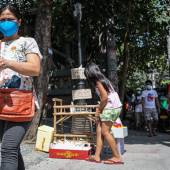World Toilet Day

It must be risky to a certain extent to use the public bathroom and toilet especially during the pandemic. A study found that sanitation and ventilation effectively limited the virus’ concentration.
What is the best way to use a public toilet? It is advisable to put a mask on before entry into toilets. It is very important to wash one’s hands immediately after the use of the toilet. A person can also wear glasses or whatever materials to protect your eyes. There are a number of high-touch surfaces, and the virus, along with bacteria, can exist on them. It’s good to minimize contact by using one’s foot or toilet paper when lifting, turning, or pulling anything.
Contact before going to the toilets isn’t as important, because a person will be washing his/her hands. The main thing is to not touch one’s face, specifically one’s mouth, nose, or eyes, before washing. And before a person leaves, it is advisable to use one’s foot, elbow (if possible), or a paper towel to open the door, and once outside, one needs to spray his/her hands with a sanitizer.
What makes shared toilets different? Actually, a toilet is a small enclosed space that's not well ventilated especially in rural areas. The conditions which we know make it easier especially in this trying times for the coronavirus to spread.
Using the toilets with people that we don't live with means we are being potentially exposed to new sources of COVID-19.
The idea of COVID-19 in a public toilet possibly spreading via toilet plume is definitely concerning.
It’s not something people like to talk about, but there’s a potential important source of COVID-19 spread that deserves a certain attention to toilets.
Source of COVID-19 spread that deserves some attention is toilets. Studies show that the coronavirus can be detected in stool samples and anal swab samples for weeks. In fact, scientists are testing wastewater as an early tracking system for outbreaks. And a recent case on an airplane identified the airplane bathroom (toilets) as the potential source.
It is also remarkable that when someone flushes the toilet, that person breathes in toilet water, and whatever is in that toilet water — including viruses and bacteria.
What to do to protect oneself? First, toilet ventilation is one’s best defense. If a person has an exhaust fan, turn it on when one enter the toilet and leave it on when one is done. If that fan is not on, or one don’t have one, it is to crack open any windows (even just a few inches will help).
Some other common sense tips is to flush the toilet when one is done (this is mostly for parents with children). Closing the lid in necessary. It is said that lidless toilets increase the risk of bacteria and larger particles escaping into the air. It is to clean and disinfect the toilet surfaces, and to wash one’s hands heartily after using the toilets.
Most importantly is to trust one’s own nose. It is advisable not to go into the toilet if it smells bad. It is the first hint that the air hasn’t been exhausted properly. To have the clean air in the toilet as far as we can is everyone’s responsibilities.
It is the responsibilities of everyone to keep the common and private toilet clean as far as possible for the improvement of everyone’s health and to promote the toilet sanitation to all, so that all may take part in creating the clean world to all.
Radio Veritas Asia (RVA), a media platform of the Catholic Church, aims to share Christ. RVA started in 1969 as a continental Catholic radio station to serve Asian countries in their respective local language, thus earning the tag “the Voice of Asian Christianity.” Responding to the emerging context, RVA embraced media platforms to connect with the global Asian audience via its 21 language websites and various social media platforms.














